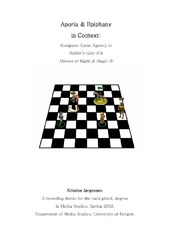Aporia & Epiphany in Context: Computer Game Agency in Baldur’s Gate II & Heroes of Might & Magic IV
Master thesis
Permanent lenke
http://hdl.handle.net/1956/1599Utgivelsesdato
2003Metadata
Vis full innførselSamlinger
Sammendrag
This thesis studies computer games from a recipient’s perspective by doing an analysis ofhow an implied player is expected by game design to take action in computer games. Fromthe assumption that the player of computer games is cast in the role as problem solver, thethesis aims to study how the player engages in the structuring of courses of action in the computerrole-playing game (CRPG) Baldur’s Gate II: The Shadows of Amn and the turn-basedstrategy game (TBS) Heroes of Might & Magic IV.The work is based upon theoretical views from different fields. One of the central conceptsutilised is agency, derived from the action theory branch of philosophy and adapted tocomputer environments by Janet Murray and Brenda Laurel. Coupled with Espen Aarseth’sclaim that a computer game player meets aporias or roadblocks in the game that must besolved by sudden epiphanies, the concept of agency will be fruitfully developed in order toinvestigate the player’s participation in computer games. Parallels will be drawn between theaporia-epiphany pair and cognitive psychology’s view on problem solving in order to identifydifferent species of problem sequences in games. Most interesting is the proposal of the conceptcomputer game agency, which denotes a kind of player action that is motivated, intentional,and has a certain effect in that it contributes to the progression of the game.The comparative analysis of Baldur’s Gate II and Heroes IV demonstrates how an impliedplayer traverses the game via the means of problem solving. BGII’s focus on role-playcreates a very different motivation for problem solving than does HoMMIV’s focus on strategy.While BGII little by little reveals the goal of the game by letting the player traverse achain of separately arranged problems, HoMMIV defines the goal beforehand and presentsnew problems within existing ones like a Chinese box. Since BGII lets the player concentrateon one problem at a time, while HoMMIV lets the player plan ahead and see problems as interrelated,it becomes clear that the games rely on different kinds of logics when it comes tohow the player is expected to traverse them.
Utgiver
The University of BergenOpphavsrett
The authorCopyright the author. All rights reserved
